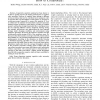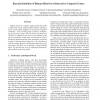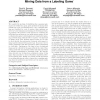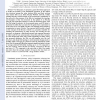1410 search results - page 106 / 282 » The Algorithmics of Solitaire-Like Games |
TCOM
2010
14 years 9 months ago
2010
—Cooperative spectrum sensing has been shown to be able to greatly improve the sensing performance in cognitive radio networks. However, if cognitive users belong to different se...
109
click to vote
MOBIHOC
2004
ACM
15 years 4 months ago
2004
ACM
In third generation (3G) wireless data networks, repeated requests for popular data items can exacerbate the already scarce wireless spectrum. In this paper we propose an architec...
106
click to vote
ICPR
2006
IEEE
16 years 14 days ago
2006
IEEE
Modern interactive computer games provide the ability to objectively record complex human behavior, offering a variety of interesting challenges to the pattern-recognition communi...
WWW
2009
ACM
16 years 1 days ago
2009
ACM
We consider the problem of identifying the consensus ranking for the results of a query, given preferences among those results from a set of individual users. Once consensus ranki...
ICC
2009
IEEE
15 years 6 months ago
2009
IEEE
— In this paper, we propose a game theoretical approach to tackle the problem of the distributed formation of the uplink tree structure among the relay stations (RSs) and their s...




